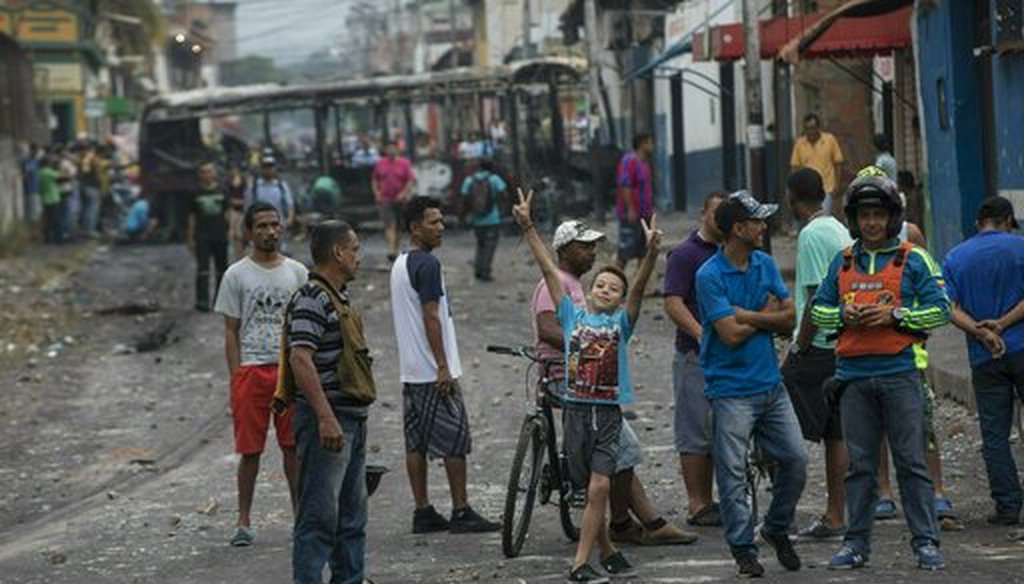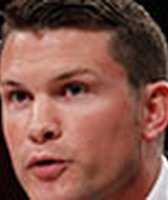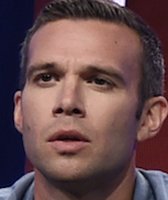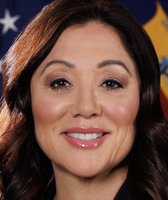Stand up for the facts!
Our only agenda is to publish the truth so you can be an informed participant in democracy.
We need your help.
I would like to contribute

Residents gather in the streets where a public bus was burned during clashes between Bolivarian National Guards and anti-government protesters in Urena, Venezuela, near the border with Colombia, Sunday, Feb. 24, 2019. (AP)
The Florida Democrats portrayed President Donald Trump as a hypocrite on Venezuela. While Trump states his support for the Venezuelan people, the party said he isn’t actually helping those who flee such brutality once they arrive on U.S. soil.
"The Trump administration has denied almost half of the Venezuelan applicants looking for asylum in the U.S., and this number will continue rising due to Trump’s hard-line stance on immigration," the Florida Democratic Party said in a Feb. 15 statement to the press.
We wanted to know if the Trump administration has really denied almost half of the Venezuelan applicants for asylum. We found the answer is not clear-cut.
The Democrats relied on a credible organization for their claim, the Transactional Records Access Clearinghouse (TRAC) at Syracuse University. But the data is not comprehensive, because it does not include cases decided by U.S. Citizenship and Immigration Services.
Since we could not get complete data on all types of asylum applications, we are not issuing a Truth-O-Meter rating. But our reporting found it is a tough hurdle to get asylum — for Venezuelans and for people of other nationalities.
Sign up for PolitiFact texts
The number of rejected applications is hard to quantify
More than 3 million people have left Venezuela in recent years amid their country’s collapse. In the United States, the largest Venezuelan-born population has blossomed in Florida.
The asylum system, which has faced a massive increase in cases over the past decade, is overwhelmed.
There are different routes to apply for asylum.
"Affirmative asylum" is filed voluntarily with USCIS. If USCIS is unable to approve a case, the agency may refer it to immigration court. "Defensive asylum" applications go before an immigration judge and are filed by individuals who are in removal proceedings.
In fiscal year 2018, 28,485 Venezuelans filed affirmative applications with USCIS. That’s almost double what it was in 2016. In September 2018, nearly one-third of all affirmative asylum applications were from Venezuela.
The Florida Democratic Party cited data from TRAC, which gathers information from the federal government.
TRAC data showed 51 percent of Venezuelan applicants were denied asylum in fiscal year 2017, which started in October 2016 when Barack Obama was president. In fiscal year 2018, 45 percent were denied. So far, in fiscal year 2019, 52 percent were denied.
This is the "almost half" that the Democrats are citing.
But as TRAC explains, that data doesn’t include cases decided by USCIS. While USCIS publishes reports showing how many people by nationality, including Venezuelans, applied for affirmative asylum each month, we couldn’t find any reports showing, by nationality, how many were granted or denied asylum in 2017 and 2018.
Sarah Pierce, a policy analyst at the Migration Policy Institute, a nonpartisan source of immigration research, told us that most Venezuelans are applying for asylum affirmatively before USCIS. But the rate at which those applicants are granted asylum isn’t public, she said.
Majority of asylum applications denied overall
A high number of denials isn’t unique to Venezuelans.
TRAC data for all nationalities show that about two-thirds of asylum applications were denied in 2018. The denial rate started to climb during Obama’s second term and has continued to rise under Trump.
"The overall asylum grant rate before immigration court is the lowest it has been since 1999," Pierce said. "So it seems likely that the Trump administration’s policies have had an effect of increasing scrutiny for asylum seekers."
To show how tough it is for applicants to get asylum, Florida immigration lawyers point to USCIS data for the outcome of cases for all nationalities in Miami. Many Venezuelans applying for asylum do so in Miami.
In September, 335 cases were approved out of 1,723 completed cases. However, the remainder were not all denials — many were referred for interviews. Denial rates are higher in Miami and Orlando immigration courts than the national average.
Andrea Martini, an immigration lawyer in Coral Gables, said that the federal government isn’t singling out Venezuelans for denials. But the administration has made changes to make the application process more difficult.
"The administration is certainly being more strict across the board with asylum applications," Martini said. "I don’t believe they are particularly targeting Venezuelans. But Venezuelans are applying in higher percentages, so naturally you are going to have higher denials."
Applicants have to prove they were persecuted in the past or will likely face persecution in the future by the government.
"That is a high burden," Martini said. "Sometimes people are victims of regular crime, which is rampant in Venezuela. That does not qualify for asylum."
Elizabeth Blandon, an immigration lawyer in Weston, said that it is impossible to say whether the denials are a result of Trump policies. But she said that USCIS has issued denials to applicants by finding there is no likelihood of future persecution, even though Trump himself spoke about lawlessness in Venezuela during his Miami speech in February.
"Trump’s recent speech says that the Venezuelan government has ‘destroyed the impartial rule of law’ and that ‘everyone who bears witness to the horrors of socialism and communism (in Venezuela, has) bravely spoken out against them,’" she said. "Either it takes courage to speak out due to fear of future persecution, or it doesn’t."
Juan Carlos Gómez, director of an immigration clinic at Florida International University law school, said some Venezuelans can’t afford to hire lawyers or they fear that if they apply for asylum they will end up in detention.
"The Venezuelans face an uncertain future because they are losing everything back home and have no safe haven, even a temporary one, in the U.S," he said.
Our Sources
Florida Democratic Party, Press release, Feb. 15, 2019
Transactional Records Access Clearinghouse at Syracuse University, Asylum and about the data, Accessed February 2019
TRAC, Asylum Decisions and Denials Jump in 2018, Nov. 29, 2018
Executive Office for Immigration Review, Adjudication statistics asylum decision rates by nationality, Fiscal year 2018
U.S. Citizenship and Immigration Service, Immigration and citizenship data, Accessed February 2019
White House, President Donald Trump speech, Feb. 18, 2019
Washington Post, Miami sees spike in asylum seekers coming from Venezuela, May 18, 2018
AP, Venezuelans find US asylum surprisingly elusive, Aug. 29, 2019
NBC, Senators push to shield Venezuelans from deportation from US, Dec. 13, 2018
Miami Herald, Trump is deporting Venezuelans to dictator Nicolás Maduro’s hell. This is why. June 14, 2018
BuzzFeed, The US Is Granting Asylum Requests At The Lowest Rate In Two Decades, New Statistics Show, Oct. 29, 2019
PolitiFact, Florida Sen. Rick Scott blames Venezuela’s collapse on socialism, but is that the real culprit? Jan. 25, 2019
Interview, Luisana Perez, Florida Democratic Party spokeswoman, Feb. 18, 2019
Interview, Andrea Martini, Florida immigration lawyer, Feb. 19, 2019
Interview, Carlos Colombo, Florida immigration lawyer, Feb. 21, 2019
Interview, Juan Carlos Gómez, Director of the Carlos A. Costa Immigration and Human Rights Clinic, immigration Florida International University, Feb. 25, 2019
Interview, Sarah Pierce, Policy Analyst for the U.S. Immigration Policy Program at the Migration Policy Institute, Feb. 19, 2019
Interview, Deborah Anker, Clinical Professor of Law, Founder and Director Harvard Immigration and Refugee Clinical Program, Feb. 19, 2019
Interview, Elizabeth Blandon, Florida immigration lawyer, Feb. 25, 2019






































